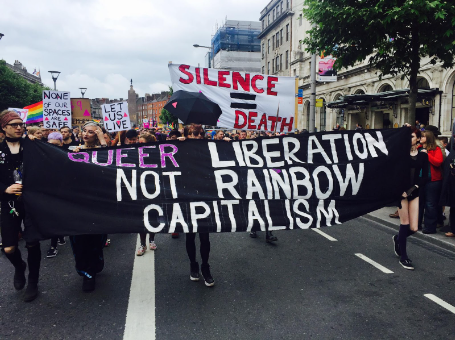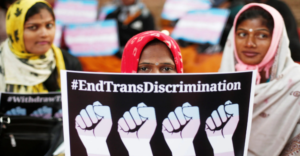In recent years, the concept of “Rainbow Capitalism” has gained traction, sparking intense debates within the LGBTQ+ community and beyond. While the rainbow flag has become an internationally recognized symbol of pride and liberation, its widespread adoption by corporations has raised questions about the motives and impact of their support. This article delves into the complexities of Rainbow Capitalism, exploring its origins, manifestations, and the potential benefits and drawbacks it brings.
Understanding Rainbow Capitalism
Rainbow Capitalism refers to the commodification and commercialization of LGBTQ+ identities and issues by corporations for profit. It involves companies using the rainbow flag and other symbols associated with the community to promote their brand, products, or services. This practice gained prominence in the 1990s, as corporations began to recognize the economic potential of targeting consumers from the community.

Motives behind Corporate Support
At the heart of the Rainbow Capitalism debate lies the question of whether corporate support for LGBTQ+ rights is driven by genuine allyship or simply a calculated marketing strategy. While some argue that corporations are embracing inclusivity and championing social progress, others contend that their actions are primarily profit-oriented, using LGBTQ+ causes as a means to boost their reputation and bottom line.
Benefits of Corporate Support
Critics of Rainbow Capitalism often overlook the positive impact that corporate support can have on LGBTQ+ rights. The visibility and financial resources provided by companies can help raise awareness, promote acceptance, and support community organizations. By lending their platforms and resources, corporations can amplify marginalized voices, foster a more inclusive culture, and encourage societal change.
Economic Empowerment
Through their financial contributions, corporations can bolster the economic power of the LGBTQ+ community. By offering employment opportunities, ensuring workplace equality, and supporting LGBTQ+-owned businesses, companies contribute to the economic empowerment of individuals who have historically faced discrimination. Such support can lead to financial stability, increased representation, and the breaking down of barriers.
Political Influence
Corporate support can also extend to the political realm, where companies have the potential to wield significant influence. By leveraging their economic might, they can advocate for LGBTQ+-friendly policies and challenge discriminatory legislation. The collective pressure from corporations has proven effective in promoting positive change, such as the successful push for marriage equality in various countries.
Challenges and Criticisms
Despite the seeming benefits, Rainbow Capitalism in reality is problematic. It leads to the “pinkwashing” of corporations—superficially embracing LGBTQ+ causes while disregarding the systemic issues affecting marginalized communities. Companies use flashy marketing campaigns during Pride Month but fail to address their internal policies or make tangible efforts to combat discrimination.
Tokenization and Appropriation
Another concern is the tokenization and appropriation of LGBTQ+ identities for profit. When corporations focus solely on profit-driven campaigns without a genuine commitment to diversity and inclusion, it can lead to the erasure of the complexities of LGBTQ+ experiences and reinforce harmful stereotypes. The cherry-picking of marketable aspects of Pride culture can trivialize the struggles faced by the community.
Commodification and Pink Dollars
Rainbow Capitalism also raises questions about the commodification of the LGBTQ+ community. By turning their identities into marketable products, corporations risk reducing the fight for equality to a transactional relationship, where purchasing power becomes the primary tool for social change. This consumerist approach can undermine the authentic progress needed for lasting societal transformation.
The Path Forward: Genuine Allyship

To address the complexities of Rainbow Capitalism, corporations must move beyond performative gestures and embrace genuine allyship. This entails more than just a rainbow-colored logo or a Pride-themed product. It involves active engagement with rainbow communities, listening to their needs, and implementing tangible actions to support their rights and well-being. Here are a few steps that companies should take to demonstrate genuine allyship:
Internal Policies and Practices: Corporations should prioritize creating inclusive workplaces by implementing non-discriminatory policies, providing LGBTQ+ sensitivity training, and establishing employee resource groups. By fostering an environment that celebrates diversity and supports LGBTQ+ employees, companies can lead by example and create a positive impact.
Philanthropic Efforts: Instead of solely relying on marketing campaigns, companies should allocate resources to support LGBTQ+ organizations and initiatives. This could involve funding youth programs, supporting healthcare services for transgender individuals, or sponsoring events that promote their rights. Transparent and sustained investment in the community can build trust and show a commitment beyond mere profit.
Collaboration with LGBTQ+ Advocacy Groups: Engaging in meaningful partnerships with various advocacy organizations can help companies gain valuable insights, ensure accountability, and amplify their impact. By actively involving community voices in decision-making processes, corporations can avoid tokenism and create initiatives that truly address the needs and concerns of the LGBTQ+ community.
Authentic Representation: Corporations should strive for authentic representation of LGBTQ+ individuals in their marketing, advertising, and media campaigns. This involves moving beyond surface-level diversity and embracing intersectionality. By accurately portraying the diversity of experiences within the LGBTQ+ community, companies can challenge stereotypes and foster a more inclusive narrative.
Long-Term Commitment: Genuine allyship requires consistency and a long-term commitment. Companies should prioritize Pride rights beyond Pride Month and allocate resources throughout the year. This sustained effort demonstrates a genuine dedication to equality and social progress rather than treating LGBTQ+ issues as a temporary marketing trend
Conclusion
While corporate support for LGBTQ+ rights can bring visibility, economic empowerment, and political influence, there are valid concerns about tokenization, appropriation, and the superficial nature of some corporate efforts. To navigate these challenges, companies must move beyond performative gestures and embrace genuine allyship. By doing so, corporations can play a meaningful role in advancing LGBTQ+ rights while fostering a more inclusive and equitable society.
-LIYA ANN MARY
Must Read: ‘NOT JUST A PHASE’





